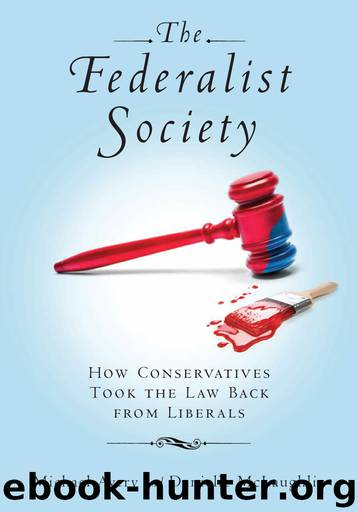The Federalist Society by Michael Avery

Author:Michael Avery [Avery, Michael]
Language: eng
Format: epub
Publisher: Vanderbilt University Press
Published: 2013-08-01T16:00:00+00:00
6
AMERICAN EXCEPTIONALISM, SOVEREIGNTY, AND INTERNATIONAL LAW
It is our true policy to steer clear of permanent alliances with any portion of the foreign world; so far, I mean, as we are now at liberty to do it; for let me not be understood as capable of patronizing infidelity to existing engagements. I hold the maxim no less applicable to public than to private affairs, that honesty is always the best policy. I repeat it, therefore, let those engagements be observed in their genuine sense. But, in my opinion, it is unnecessary and would be unwise to extend them.
—George Washington1
In 2000, Peter Spiro described what he termed the “new sovereigntists” in Foreign Affairs. Acknowledging that the United States has historically been wary of participation in global governance, for fear of compromising its freedom of action, Spiro identified a growing band of influential conservatives who could not be regarded as pure isolationists because they were amenable to international law and institutions, but only to the extent that the law and institutions suited the interests of the United States. He called this “international law à la carte.”2
Many of these new sovereigntists have found a home in the Federalist Society. They share a realist view of foreign relations—that in an anarchic world community, each country will act to advance its own interests. They believe that as the hegemonic power within that community, the United States may pick and choose which international organization it supports, which treaty it ratifies, which international agreement it follows, and whether its own military action requires international support.
There is no such thing as a single “conservative” approach to international law and institutions, nor is there a cohesive policy that the Federalist Society as a group subscribes to. This chapter does not purport to describe a concise ideology or program designed to rebuff the influence of international law, norms, and institutions on U.S. law. Rather, it discusses how members of the Federalist Society, and the organization itself, have steered the conversation about America’s place in the world.
Conservative academics, policymakers, lawyers, government officials, and members of the judiciary—many of whom have ties to the Federalist Society—have produced volumes of scholarship, speeches, amicus briefs, court decisions, and memoranda. These works reveal a number of core ideas around which this chapter is structured.
This chapter begins with an introduction to American Exceptionalism, and then explores the ideology of the new sovereigntists, who believe in American self-determination above all. This ideology incorporates:
• A realist view of “sovereignty.” This is a rejection of international law and international institutions to the extent that they interfere with the United States’ absolute right of self-determination. In comparison, the idealist view of sovereignty embraces cooperation via alliances, treaties, and the rule of international law as a means to promote greater prosperity and stability for the entire system of nations.
• The rule of domestic law. This holds that (1) international law (for example, the Geneva Conventions or the decisions of international courts) and (2) foreign law (for example, a foreign court’s ruling on
Download
This site does not store any files on its server. We only index and link to content provided by other sites. Please contact the content providers to delete copyright contents if any and email us, we'll remove relevant links or contents immediately.
| Anarchism | Communism & Socialism |
| Conservatism & Liberalism | Democracy |
| Fascism | Libertarianism |
| Nationalism | Radicalism |
| Utopian |
The Secret History by Donna Tartt(19065)
The Social Justice Warrior Handbook by Lisa De Pasquale(12189)
Thirteen Reasons Why by Jay Asher(8896)
This Is How You Lose Her by Junot Diaz(6880)
Weapons of Math Destruction by Cathy O'Neil(6269)
Zero to One by Peter Thiel(5791)
Beartown by Fredrik Backman(5740)
The Myth of the Strong Leader by Archie Brown(5504)
The Fire Next Time by James Baldwin(5433)
How Democracies Die by Steven Levitsky & Daniel Ziblatt(5217)
Promise Me, Dad by Joe Biden(5147)
Stone's Rules by Roger Stone(5083)
A Higher Loyalty: Truth, Lies, and Leadership by James Comey(4955)
100 Deadly Skills by Clint Emerson(4921)
Rise and Kill First by Ronen Bergman(4781)
Secrecy World by Jake Bernstein(4745)
The David Icke Guide to the Global Conspiracy (and how to end it) by David Icke(4711)
The Farm by Tom Rob Smith(4503)
The Doomsday Machine by Daniel Ellsberg(4486)
